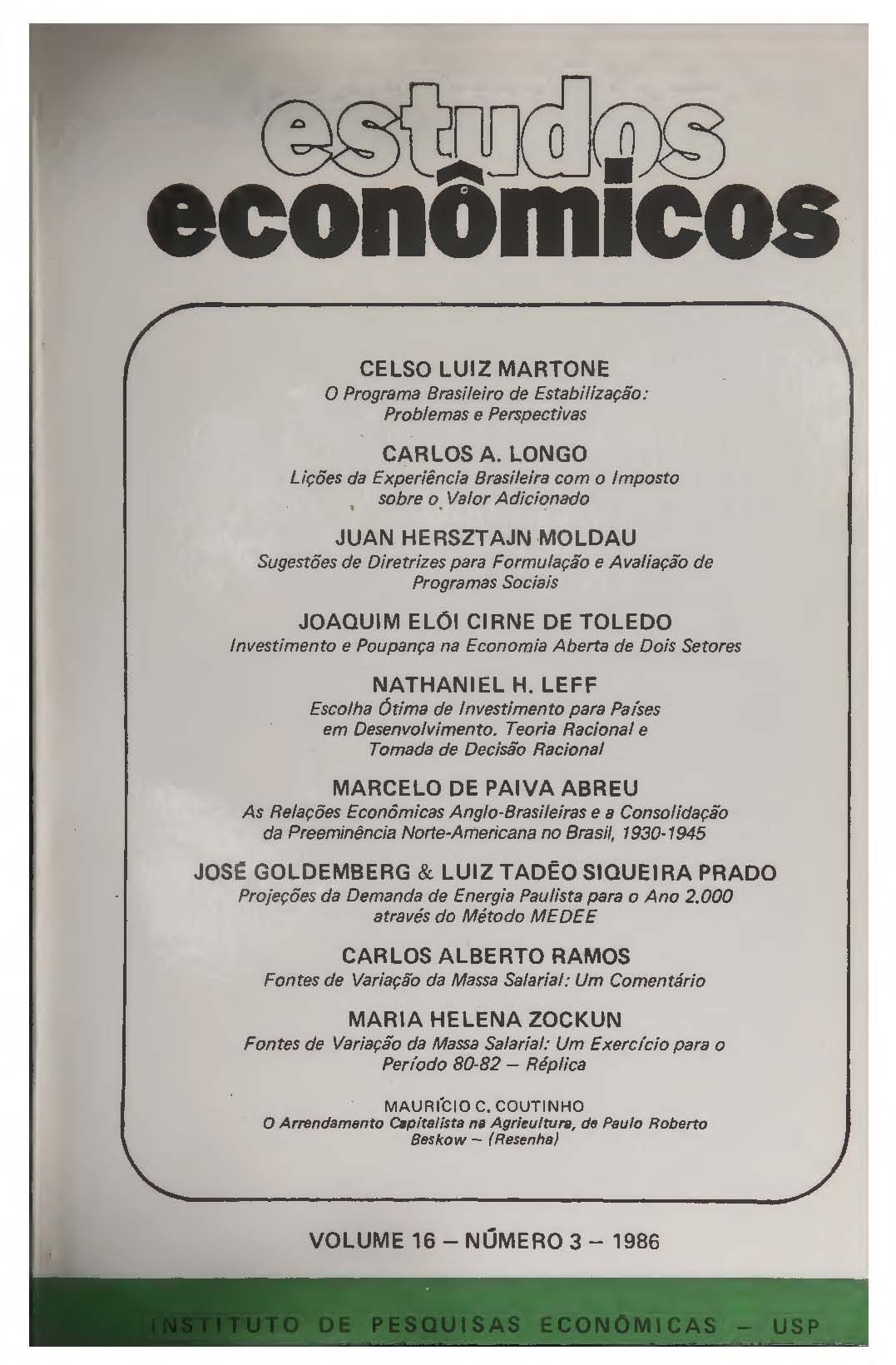Escolha ótima de investimento para países em desenvolvimento: teoria racional e tomada de decisão racional
DOI:
https://doi.org/10.11606/1980-53571635nhlResumo
Este trabalho analisa um aspecto fundamental do processo conceitual que os governos utilizam para fazer as escolhas dos principais investimentos nos países em desenvolvimento. Tanto através de suas atividades de investimentos diretos, quanto através de incentivos especiais (tais como: crédito, taxa de câmbio e incentivos fiscais) que eles proporcionam, os governos geral mente assumem um papel decisivo na alocação de recursos de investimento nas nações subdesenvolvidas. Consequentemente, o processo de escolha do investimento público tern efeitos signficativos sobre a eficiência da formação de capital e sobre o crescimento econômico nos países em desenvolvimento. Embora o processo de escolha de investimento aqui focalizado tenha importantes implicações teóricas e práticas, o mesmo tem recebido pouca atenção analítica até o momento.
Downloads
Referências
BELL, C; SLADE, R. & HAZELL, P. Project Evaluation in Regional Perspective. Baltimore, Johns Hopkins University Press, 1982.
BERTRAND, T. B. Shadow Pricing in Distorted Economies. American Economic Review, 69: 902-914, dec. 1979.
BLITZER, C.; DASGUPTA, P. & STIGLITZ, J. Project Appraisal under Foreign Exchange Constraints. Economic Journal 91:58-74, 1981.
BOULDING, K. The Image. Ann Arbor, Ml, University of Michigan, 1956.
BRUTON, H.J. Egypt's Development in the Seventies. Economic Development and Cultural Change 31: 679-704, July 1983.
CAIDEN, N. & WILDAVSKY, A. Planning and Budgeting in Poor Countries. New York, Wiley, 1974.
CHOSKI, A; MEERHAUS, A. & STOUTJESDIJICK, A. The Planning of Investment Programs in the Fertilizer Industry. Baltimore, Johns Hopkins University Press, 1980.
CURRIE, L. The Role of Economic Advisors in Developing Countries. Westport, Greenwood, 1981.
DELFIM NETTO, A. O Problema do Café no Brasil. São Paulo, FEA/USP, 1959.
ELIAS, V. J. Sources of Growth in Latin American Countries. Review of Economics and Statistics 60: 363-370, Aug., 1978.
FOXLEY, A. Latin American Experiments with Nonconservative Economics. Berkeley, University of California, 1983.
HARBERGER, A.C. Project Evaluation. Chicago, Markham, 1973.
HAYEK, F.A. The Use of Knowledge in Society. American Economic Review 35: 519-530, sept. 1945.
HIRSCHMAN, A. The Strategy of Economic Development. New Haven, Yale, 1958.
HIRSCHMAN, A. Development Projects Observed. Washington, Brookings Institution, 1967.
HURNI, B. The Lending Policy of the World Bank in the 1970's. Boulder, Westview, 1980.
IMBODEN, N. A Management Approach to Project Appraisal and Evaluation. Paris, OECD, 1978.
KING, T. Development Strategy and Investment Criteria: Complementary or Competitive? Quarterly Journal of Economics 86:108-120, feb. 1966.
KNIGHT, A. Industrial Policy. In: CAIRNCROSS, F. (ed.). Changing Perceptions of Economic Policy. London, Methuen, 1981.
KORNAI, J. Appraisal of Project Appraisal. In: BOSKIN, M. (ed.) Economic and Human Welfare: Essays in Honor of Tibor Scitovsky. New York, Academic Press, 1979.
KRUEGER, A.O. Some Economic Costs of exchange control: The Turkish Case. Journal of Political Economy- 74: 466-480, Oct. 1966.
KRUEGER, A.O. The Political Economy of the Rent Seeking Society. American Economic Review 64: 291-303, Sept. 1974.
KUHN, T. The Structure of Scientific Revolutions. Chicago, University of Chicago Press, 1970.
LEFF, N.H. Economic Policy-Making and Development in Brazil, 1947-1964. New York, Wiley, 1968.
LEFF, N.H. Externalities, Information Costs and Social Benefit - Cost Analysis for Economic Development: An Example
from Telecommunications. Economic Development and Cultural Change: 255-278, Jan. 1984.
LIPTON, M. Why Poor People Stay Poor: Urban Bias in World Development. Cambridge, Harvard University Press, 1977.
LITTLE, I.M.D. & MIRRLEES, J. Manual of Industrial Project Analysis in Developing Countries. Paris, OECD, 1968, V.II.
MARGLIN, S. Public Investment Criteria. London, Allen and Unwin, 1966.
MURELIUS, O. An Industrial Approach to Project Analysis in Developing Countries. Paris, OECD, 1981.
NELSON, R.R. & WINTER, S.G. In Search of Useful Theory of Innovation. Research Policy 6, 1977.
An Evolutionary Theory of Economic Change. Cambridge, Harvard University Press, 1982.
NURKSE, R. Problems of Capital Formation in Underdeveloped Countries. New York, Oxford University Press, 1961.
PARKINSON, C.N. Parkinson's Law. London, John Murray, 1960.
ROBINSON, S. Sources of Growth in Less Developed Countries: A Cross Section Study. Quarterly Journal of Economics 85: 391-408, Aug. 1971.
SAUNDERS, R. Telecommunications in Developing Countries: Constraints on Development. In: JUSSAWALLA, M. & LAMBERTON, D.M. (eds.) Communication Economics and Development. New York, Pergamon, 1982.
SCHULTZ, T.W. Distortions of Agricultural Incentives. Minneapolis, University of Minnesota Press, 1980.
SEERS, D. Why Visiting Economists Fail. Journal of Political Economy 70: 325-338, Aug. 1962.
SEN, A.K. Control Areas and Accounting Prices: An Approach to Economic Evaluation. Economic Journal 82 (suppl.): 483-501, March 1972.
SIMON, H.A. Applying Information Technology to Organization Design. Public Administration Review 35, May 1973.
SIMON, H.A. Rationality as Process and as Product of Thought. American Economic Review 68, May 1978.
SIMON, H.A & NEWELL, A. Human Problem Solving. New York, Prentice-Hall, 1972.
SQUIRE, L. & VAN DER TAK, H. Economic Analysis of Projects. Baltimore, Johns Hopkins University Press, 1975.
STEWART, F. & STREETEN, P. Little - Mirrlees Methods and Project Appraisal. Bulletin of the Oxford University Institute of Economics and Statistics, p. 75-92, Feb. 1972.
THALER, R.H. & SHEFRIN, H.M. An Economic Theory of Self-Control. Journal of Political Economy 89: 392-406, April 1981.
UNIDO (DASGUPTA, P.; SEN, A.K. & MARGLIN, S.). Guideline for Project Evaluation. New York, United Nations, 1972.
VAN DE LAAR, A. The World Bank and the Poor. Boston, Nijhoff, 1980.
YOUNG, A.A. Increasing Returns and Economic Progress. Economic Journal 38: 527-542, Dec. 1928.
Downloads
Publicado
Edição
Seção
Licença
Direitos autorais (c) 1986 Nathaniel H. Leff

Este trabalho está licenciado sob uma licença Creative Commons Attribution-NonCommercial 4.0 International License.
A submissão de artigo autoriza sua publicação e implica o compromisso de que o mesmo material não esteja sendo submetido a outro periódico.
A revista não paga direitos autorais aos autores dos artigos publicados.





 Atualizado em 30/01/2026
Atualizado em 30/01/2026